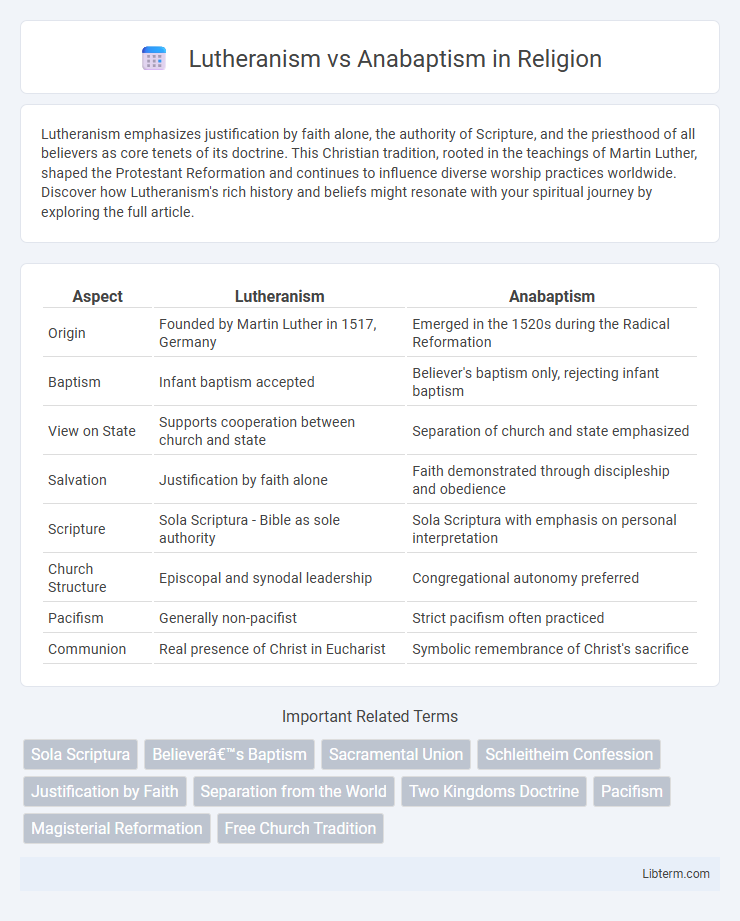Lutheranism emphasizes justification by faith alone, the authority of Scripture, and the priesthood of all believers as core tenets of its doctrine. This Christian tradition, rooted in the teachings of Martin Luther, shaped the Protestant Reformation and continues to influence diverse worship practices worldwide. Discover how Lutheranism's rich history and beliefs might resonate with your spiritual journey by exploring the full article.
Table of Comparison
| Aspect | Lutheranism | Anabaptism |
|---|---|---|
| Origin | Founded by Martin Luther in 1517, Germany | Emerged in the 1520s during the Radical Reformation |
| Baptism | Infant baptism accepted | Believer's baptism only, rejecting infant baptism |
| View on State | Supports cooperation between church and state | Separation of church and state emphasized |
| Salvation | Justification by faith alone | Faith demonstrated through discipleship and obedience |
| Scripture | Sola Scriptura - Bible as sole authority | Sola Scriptura with emphasis on personal interpretation |
| Church Structure | Episcopal and synodal leadership | Congregational autonomy preferred |
| Pacifism | Generally non-pacifist | Strict pacifism often practiced |
| Communion | Real presence of Christ in Eucharist | Symbolic remembrance of Christ's sacrifice |
Origins and Historical Background
Lutheranism emerged in the early 16th century as a reform movement initiated by Martin Luther in Germany, emphasizing justification by faith and the authority of Scripture. Anabaptism originated around the same period but distinguished itself by advocating adult baptism and separation from state control, often facing severe persecution. Both movements significantly influenced Protestant Christianity, yet their historical contexts and theological emphases set them apart during the Reformation.
Founders and Key Figures
Lutheranism was founded by Martin Luther, whose 1517 Ninety-Five Theses ignited the Protestant Reformation and emphasized justification by faith alone. Key figures in Lutheranism include Philip Melanchthon, a collaborator who systematized Lutheran doctrine, and Duke Frederick the Wise, a protector of Luther. Anabaptism originated with leaders like Conrad Grebel and Felix Manz, who advocated adult baptism and radical church reform during the Swiss Reformation, facing severe persecution for their views.
Core Theological Beliefs
Lutheranism emphasizes justification by faith alone, the authority of Scripture, and the sacraments of Baptism and Communion as means of grace instituted by Christ. Anabaptism stresses believer's baptism upon confession of faith, a voluntary church membership, and a commitment to pacifism and separation from state affairs. Both traditions uphold the lordship of Christ but diverge on ecclesiology and the role of sacraments in the believer's life.
Views on Baptism
Lutheranism teaches baptism as a sacrament that grants grace and initiates believers into the Christian faith, typically practicing infant baptism as a means of God's promise and cleansing from original sin. Anabaptism rejects infant baptism, emphasizing believer's baptism based on personal faith and repentance, viewing it as a public declaration of commitment rather than a means of grace. These differing views highlight Lutheranism's sacramental theology versus Anabaptism's emphasis on conscious confession and voluntary church membership.
Understanding of the Sacraments
Lutheranism emphasizes the real presence of Christ in the sacraments, particularly in the Eucharist, affirming Baptism as a means of grace that imparts faith and forgiveness. Anabaptism rejects sacramental efficacy by faith alone and sees Baptism and the Lord's Supper primarily as symbolic acts of obedience and public confession. This fundamental difference highlights Lutheranism's sacramental theology centered on divine grace, contrasting with Anabaptism's focus on believers' personal commitment and discipleship.
Church Governance Structure
Lutheranism practices a hierarchical church governance structure, typically led by bishops or superintendents overseeing congregations with defined doctrinal authority. Anabaptism embraces congregational autonomy, where local churches govern themselves through bodies of elected elders or ministers, emphasizing direct community involvement and consensus. The contrasting frameworks reflect Lutheranism's structured clerical order versus Anabaptism's decentralized, democratic church polity.
Relationship with State and Society
Lutheranism traditionally supports a cooperative relationship between church and state, emphasizing the state's role in maintaining order and supporting the church's mission within society. Anabaptism rejects state control over religious matters, advocating for voluntary church membership and separation from governmental authority to preserve religious purity and individual conscience. This fundamental difference shapes Lutheranism's integration into societal structures, while Anabaptism often promotes communal autonomy and nonconformity to worldly power.
Worship Practices and Liturgy
Lutheranism emphasizes a structured liturgy with formal ceremonies, including the use of vestments, traditional hymns, and a strong focus on the sacraments of Baptism and the Eucharist as means of grace. Anabaptism generally favors simplicity in worship, rejecting elaborate rituals, and promoting congregational participation with unaccompanied singing and spontaneous prayer. The divergence in worship practices reflects Lutheranism's retention of historic liturgical elements, while Anabaptism prioritizes community-oriented and non-liturgical expressions of faith.
Approach to Scripture and Authority
Lutheranism upholds Scripture as the sole authority for faith and practice, emphasizing justification by faith through clear biblical teachings while maintaining the historical creeds and confessions like the Augsburg Confession. Anabaptism also prioritizes Scripture but interprets it through a lens of radical discipleship and believer's baptism, rejecting infant baptism and stressing the importance of a personal, communal experience of faith guided by the New Testament. Both traditions affirm the Bible's central role yet differ in their hermeneutics and ecclesiastical authority, with Lutherans aligning more with established church structures and Anabaptists advocating for a voluntary, regenerate church community.
Legacy and Modern Influence
Lutheranism has profoundly shaped Protestant liturgy and doctrine, influencing numerous national churches and ecumenical dialogues worldwide. Anabaptism's legacy lies in its radical commitment to believer's baptism, nonviolence, and separation of church and state, inspiring modern peace churches and social justice movements. Both traditions continue to impact contemporary theological discussions, with Lutheranism prominent in mainline Protestantism and Anabaptism influential in Mennonite and Amish communities.
Lutheranism Infographic

 libterm.com
libterm.com